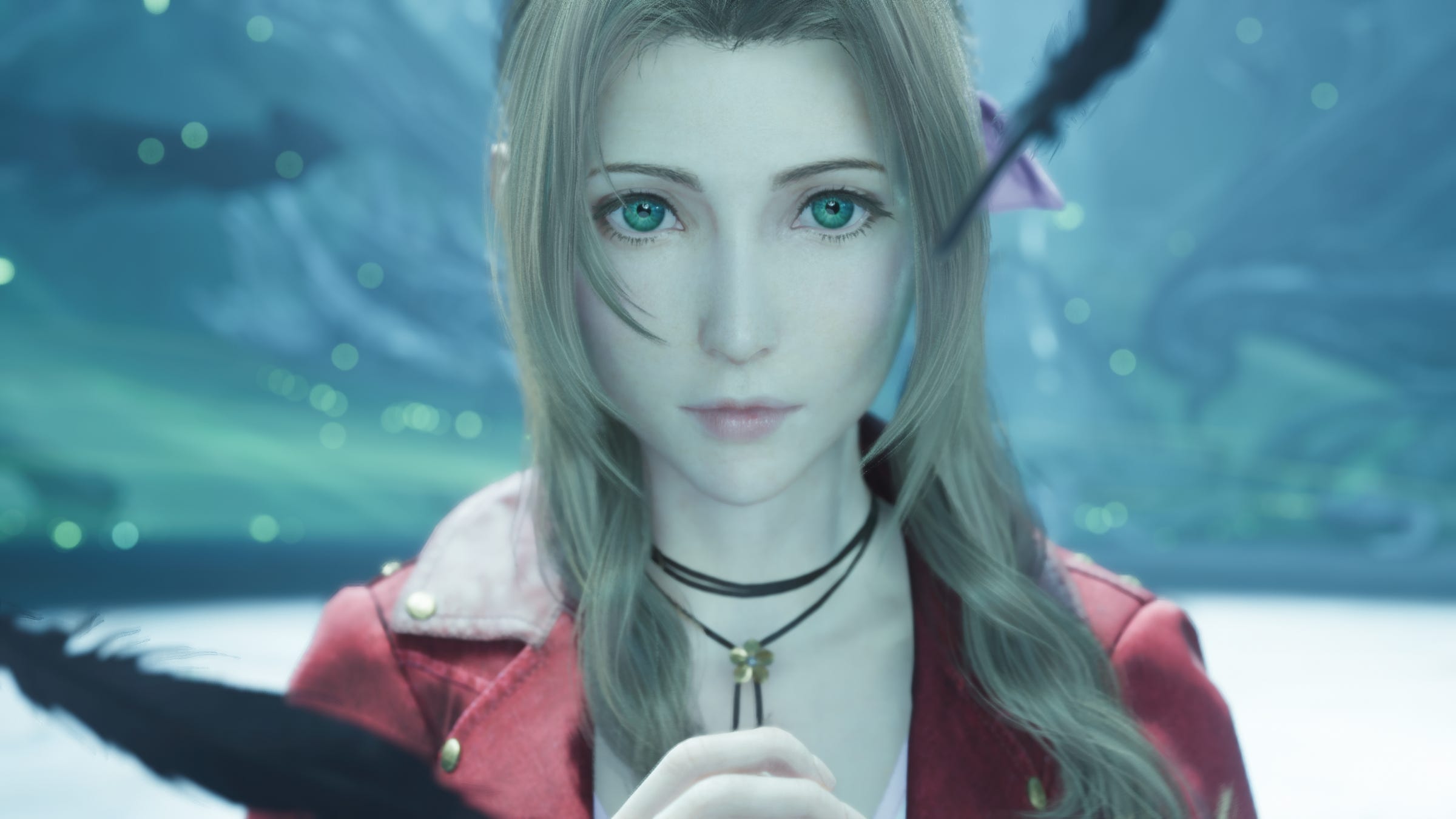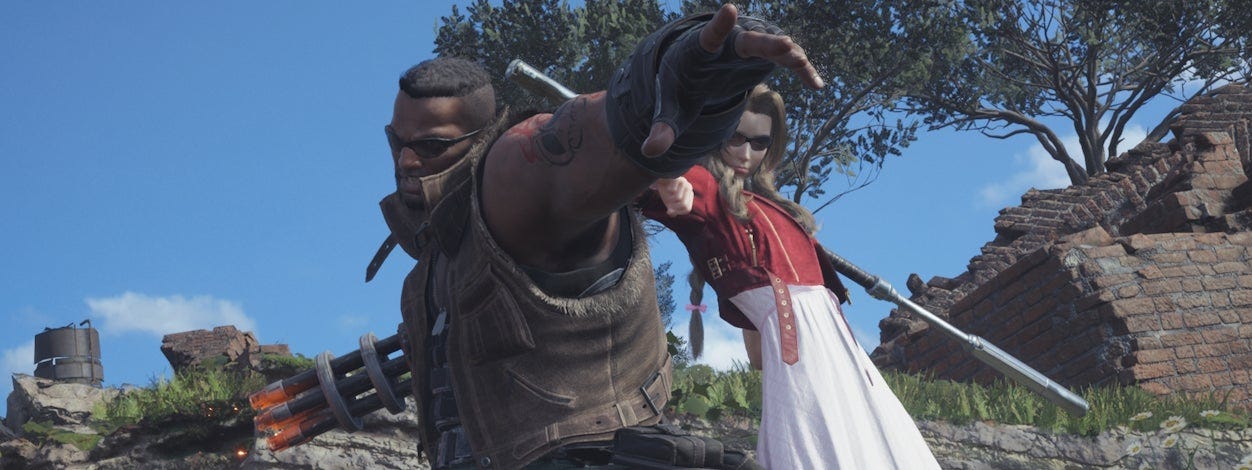Final Fantasy VII: Rebirth is the First Good Remake
Video game remakes are a dime a dozen, but only one remake is about being a remake.
“Cause here’s the thing
To know how it ends
And still begin to sing it again
As if it might turn out this time
I learned that from a friend of mine…
He could make you see the way the world could be
In spite of the way that it is”
-Hadestown
The Myth and Legend of Final Fantasy VII
Aerith’s death in Final Fantasy VII at the hands of Sephiroth is the “Luke, I am your father,” of video games.
If you talk to anyone remotely present in a gaming space, they will not only know the iconic FF7 cast of characters— Cloud with his comically large Buster Sword, Sephiroth with his comically long katana— they will also know the general story, including the heartbreaking twist, even if they’ve never played the game themselves.
The logical next step for such a beloved story over twenty years since its original release was, of course, a remake. The Last of Us (we’re calling it Part 1, now) was released in 2013 originally and has been remastered, remade, and televised. It took Pedro Pascal for my mom to finally care. Of course FF7 is deserving of similar treatment. The remake would be a trilogy, the first installment being Final Fantasy VII: Remake in 2020.
Remake was a critical and commercial success, revered by fans and critics for its innovative take on the classic tale, telling us a renewed story of resistance and struggle under an oppressive corporate government. In doing so, it also served as a meta commentary on Final Fantasy VII itself. That Remake is, well, a remake, serves as subtext within the game as forces beyond the character’s understanding try to keep them on a specific path, intervening whenever events take place that did not occur in 1997’s FF7. “Fate,” or the events of the original game, plays a role, and in the first of the remade trilogy, Cloud, Aerith, Tifa, Barret, and the rest of their party destroy those bonds, leaving the rest of the trilogy a blank slate. The game ends with the title card, “The Unknown Story Will Continue.”
I couldn’t believe it. The most effecting, devastating video game death may be undone in this remake. It was all Final Fantasy fans could think about in the four years between Remake, and the second of the trilogy, Final Fantasy VII: Rebirth, released in 2024. Would the events of Final Fantasy VII play out in a happier way? Would the tragedy of Aerith’s death be averted? Just like that, the development team created uncertainty in a remake.
The sequel released, we played it, and were reminded once again of the tragedy, the inevitability of death.
The Not So Unknown Story
“This is why we retell, reimagine, recontextualize myths and legends, even when they end in tragedy. Every time we start to retell it, we are reminded of hope.”
A couple of months removed from the initial release of Rebirth you’ll see a much different story than its predecessor. Reviews were mixed, with some criticising the open world feeling bloated with meaningless tasks and collectathons. The ending was largely panned by players and critics claiming it convoluted and ultimately unsatisfying.
I took my time with Rebirth, and ignored all coverage of the game until I had finished it for myself. One thing about the game struck me early on and only deepened the more I played.
Nothing has changed.
Many of the beats of Final Fantasy VII’s middle portion remain intact in its remake despite the promise of an “unknown story.” I kept playing, and the reality continued to sink in: It’s FFV but bigger. There are more character interactions encouraged by a friendship system displayed above party member’s heads so you know Clouds friendship levels with each of his companions. These levels serve a purpose in combat as well, allowing for powerful Synergy Abilities between characters with strong connections. This adds a mechanical element to something we already know about FF7 from 1997, which is many of these characters have reached icon, even mythical status within video games, and their relationships have always been the core of the series.
Along with that, the many, many side quests and minigames, which have been a major point of criticism, allow for the strengthening of these bonds between characters. Many of the minigames are quite fun as well, especially the breakout card game, Queen’s Blood. The criticism is in these minigames’ irrelevance to the story. At first glance, they don’t offer any meaningful progression. They are just fun, optional distractions to fill the open world environments.
Finally there is the critique that Rebirth ends unsatisfyingly, needlessly convoluted, and bogged down by a multiversal story that even I can admit went a little off the rails. While Remake depicts two parallel universes to tell a story about fate, Rebirth blows the door of the hinges, introducing infinite worlds and possibilities, threatening to make any action or moment meaningless.
All of these critiques are perfectly valid, and in many cases I agree with them. Bloated, meaningless open worlds, convoluted multiverse stories that often only exist to kill characters off and bring them back to life are damning critiques of any normal game that would convince me not to waste my time. Final Fantasy VII is not a normal game.
Rebirth, like Remake, has a unique mechanic. One that only a remake— and perhaps even a game as beloved and well known as FF7— can implement. The player knows the story. They know the twists and turns, the characters, their relationships, the tragedy. Aerith will die again. It became more and more clear that her time is still limited as I played Rebirth. These characters will go through the same tragedy as before, but this time we know it is coming. The development team knows we know and have mercifully filled the world with memories to be made. We don’t want Aerith to die, but she will. All we can do is make the most of the time we are given. So we can play a game of cards, learn piano, race chocobos. All of it is time spent with loved ones before it’s too late.
I chose to take that time. Knowing what was to come, I spent every moment I could with characters I love in a world I wanted to explore, and in doing so I created more memories for Cloud, Aerith, and the rest of the party. I could do so with the benefit of hindsight. The mechanic of knowing.
This is the true justification for the remake. This is why we retell, reimagine, recontextualize myths and legends, even when they end in tragedy. Every time we start to retell it, we are reminded of hope. We can feel it, like a train. We can aspire to that feeling, even if we believe it will end in tragedy.
To change the tragic fate of Aerith Gainsborough would be to fundamentally change the themes of Final Fantasy 7. While remakes that re-contextualize and modernize the original are valid as interpretations, Rebirth opts to do this in a different way. It plays on our understanding of the 1997 FF7 and our desire to rewrite the past. In stripping away our hope after the promise of a new outcome we are reminded of our powerlessness in the face of death— it cannot be stopped. But to lose hope, there has to be hope. Something to live, fight, and play for. It forces us to contemplate, then, not just the end where death is inevitable but all that comes before. If we know Aerith will die and she will always die, suddenly the plethora of minigames and checklists strewn about Rebirth’s open world become more than just filler. It is all just a little more time spent with people you love while you still can.
“It’s a sad song
But we keep singin’ even so
It’s an old, old, old tale from way back when
And we’re gonna sing it again and again
We’re gonna sing it again.”
-Hadestown







This is so damn good. And completely encapsulates why I was so taken with Rebirth